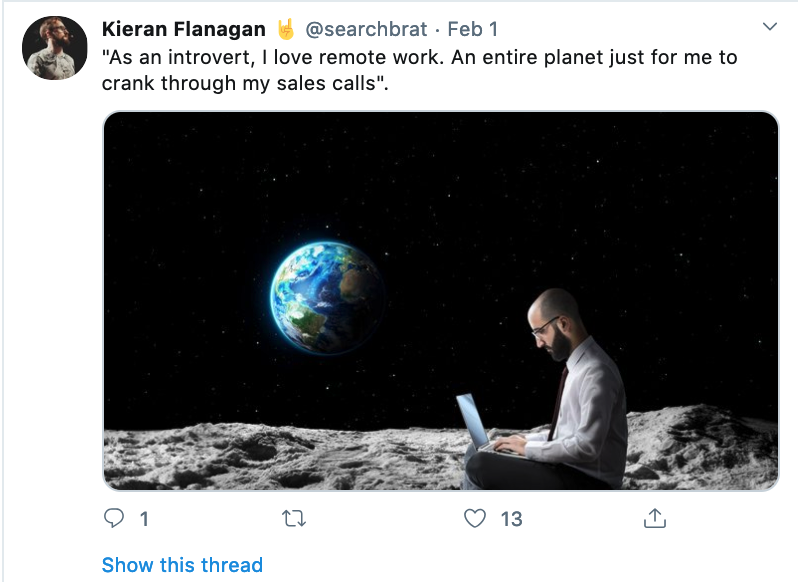When you Google image search remote work, you'll find photos that tell fascinating stories about the work style.
For example, you might find a relaxing image of a woman working with her laptop on the beach -- without a care that sand or water could destroy her hard drive.

Or, you might discover a scene where a man logs into a team video chat after a treacherous climb to the top of a mountain.

As you get deeper into the results, the visual narrative gets more mystifying. You might even find a scene from sci-fi drama where a remote employee ventures to the moon just to avoid his colleagues.
But, as HubSpot Marketing VP Kieran Flanagan likes to point out in his tweets -- this is not the reality of remote work:

While some stock image companies might like to assume that all remote employees are introverts who work antisocially from the Moon, this is far from the truth.
And although more traditional employers might worry that remote employees aren't as productive as their in-office counterparts, this work style is being implemented more heavily around the world because it provides so many benefits to employees and companies.
Not only do remote workers save companies money, but remote work opportunities increase job retention and allow employers to globally hire diverse or innovative employees that they couldn't have otherwise due to location limitations.
Not to mention -- for every myth, there's almost always a research-proven benefit that debunks it.
To give employers and prospective remote employees an accurate look inside the workstyle, I asked a handful of colleagues within our growing remote workforce to reveal the biggest myths they've ever heard -- and what the real story behind them is.
5 Remote Work Myths to Leave Behind
1. "Remote employees are lazy and barely do work."
When you're working remotely, your in-office colleagues and superiors usually have no clue what you're doing at any given moment.
Because remote employees aren't sitting next to bosses or colleagues, skeptics assume that they do less work than employees who can't easily slack in an office setting.
Time and time again, this theory has been disproven. In fact, many remote workers say they actually work longer hours than office employees who have hard stops at the end of the day.
"Now that my office is in my house, I've found that I work longer hours but more flexible hours which has improved my quality of life," says Tony Baum, a Colorado-based HubSpotter. "In addition, my performance has increased since I've started to work remotely now that there are fewer distractions in the office and I can focus on my work day-to-day."
"Studies show that remote employees work longer hours than the average employee. I can attest to that personally," adds Elle Fening, an Inbound Success Coach who's held remote roles for more than 13 years.
"As the lines between home and work blur, it's hard to know when to walk away from the office. It's too easy to open up the laptop, work on a task, and find yourself still staring at your computer three hours later," Fening says.
2. "Remote employees as lonely."
Because remote employees don't work on a floor filled with cubicles and other employees, people often think that they don't like to talk to others or aren't good team players. Meanwhile, some who are interested in working remotely worry that they won't gain valuable in-person connections with other people.
"On paper, working remotely can seem really lonely -- but it doesn't have to be," explains Lestraundra Alfred, a staff writer for the HubSpot Sales Blog.
"Working remotely, I've learned the importance of remaining in constant communication with your team about your wins, challenges, and priorities," Alfred says. "Although you can't necessarily walk a few feet to your colleague's desk when you have a question, you don't have to be an island of one -- and being intentional about communicating with your team is a huge help."
Ben Johnson, who works remotely in Freemium Acquisition, echoed Alfred's statement.
"Before I started a remote role, many people warned me that working away from an office would make me a hermit," says Johnson. "I’ve actually taken the remote opportunity to be more social — proactively scheduling lunches, coffees, and coworking with others. I’m meeting new people and having more regular meetups with friends.”
To stay visible and continue to socialize with employees, like Johnson and Alfred, you should take steps to connect with your team virtually, such as having video coffee chats or regular check-ins with team members. This facilitates a strong relationship with team members even if you aren't in the office that often/
3. "You'll have a way better work-life balance."
When you envision someone working from home, you might imagine them doing a few work tasks, then taking on other home-life related tasks, such as taking care of their kids, cleaning the house, or cooking dinner for the family. In reality, successful remote employees sit at their desks during work hours and avoid home-life interruptions at all costs.
Rebecca White, a junior staff writer for the HubSpot Blogs, warns that "everyone around you" will think that working remotely means you have more time to manage your personal life.
"You still have a job to get done, but sometimes people in your life assume they can walk up and talk to you, hang out, or ask you to run errands," White says.
So how do you fix this issue? White advises that remote employees be blunt and fully transparent with friends or loved ones.
"You have to be able to say, 'I'm sorry, I'm at work right now, let's discuss this when I'm not working,' which can be hard to do," White concludes.
4. "You can't be a people manager if you're remote."
While traditional employers are skeptical of hiring remote employees that they can't monitor in-office, imagine how they might feel about managers.
In fact, one of the biggest myths that HubSpot has disproved time and time again is that "remote employees can't be managers.
Actually, a large chunk of our more than 300-person remote workforce is made up of mid to high-level managers.
Even on my small blog team, we have two full-time remote people managers who smoothly work with and supervise team members from their homes in different states. As we continue to increase our blogs annual traffic and churn out dozens of high-quality blog posts each week, it's clear that these managers' remote statuses aren't hindering our performance. In fact, their expert insights actually help us work better and more effectively.
5. "You'll have plenty of time for self-care if you work remotely."
When you start out as a remote employee, you might be excited about what your flexible schedule will allow you to do.
For example, you might think to yourself, "Hey, I'll actually use that gym membership." or, "Maybe I'll take more time for meditation when I'm off the clock." If these thoughts have passed through your mind, think again.
Meg Prater, the HubSpot Blog's Managing Editor, learned early on that the remote lifestyle is actually incredibly busy.
"I always thought I’d turn into a super-athletic woman when I became remote. I thought I’d go to yoga every day during lunch, take up running as a mid-morning break. It turns out, I sometimes forget to take a break long enough to refill my coffee cup -- let alone run to a yoga class mid-day," Prater reveals.
Prater adds, "I’ve been really trying to be better about making time for myself, but it’s been way harder to carve out that time than when I had a 9-to-5 in-office job with a hard stop."
Christina Perricone, a marketing manager for the HubSpot Blogs, similarly echoed this sentiment.
"Work-life balance can become a distant goal when you start working remotely. Without hard time cut-offs, it's very easy for work to bleed into every area of your life. At best, those lines become blurred. At worst, work becomes your entire life," Perricone explains.
"I think this happens for two reasons," Perricone adds. "First, the internal pressure to prove to your employer that you're being productive. Second, an inability to set boundaries."
As a remote employee, it can be extremely helpful to create set hard work and personal life schedules to ensure that you're getting a proper balance of both. To make sure your schedule is respected by teams in other time zones or locations, it can be helpful to have a shared Google Calendar where you show your availability, working times, and off-the-clock hours. For more tips on how to improve remote work-life balance, check out this blog post.
Navigating Remote Work Myths
When it comes to remote work, there are plenty of studies and first-hand employee stories that debunk most of the worst myths out there.
As you've seen above, the myths surrounding "poor work ethic" or "less career opportunities" are incredibly false. As a remote employee manager or someone considering a remote workstyle, you'll want to continue to do read up on this workstyle to discover real research-backed benefits and challenges related to it.
To learn more about successful work-from-home strategies, check out these tips from remote HubSpot employees, this guide to gaining company visibility, and this helpful list of remote work stats.
If you work from home part-time or full-time and want to create an effective workspace, scroll through this visual rundown of our favorite remote setups.
from Marketing https://ift.tt/38FI8ln

No comments:
Post a Comment